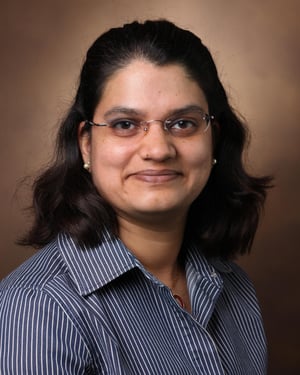MEET SUNEETHI
 As a postdoctoral fellow at Vanderbilt University, Suneethi Ford of Data Science Cohort 3 used data analysis in her studies of mechanisms in cancer growth. She shares, “one of these projects involved analysis of a huge amount of data from a sequencing experiment and used some basic R commands for the analysis.” The project inspired her to explore R and Python through online courses. “This initial learning and my love for data analysis steered me towards learning data science.”
As a postdoctoral fellow at Vanderbilt University, Suneethi Ford of Data Science Cohort 3 used data analysis in her studies of mechanisms in cancer growth. She shares, “one of these projects involved analysis of a huge amount of data from a sequencing experiment and used some basic R commands for the analysis.” The project inspired her to explore R and Python through online courses. “This initial learning and my love for data analysis steered me towards learning data science.”
“My experience in biomedical research, business development and clinical trials revolved around one aspect: data that provided knowledge,” she states. “I pursued data science to learn tools to turn vast amounts of data into insights that will facilitate business decisions.”
THE NSS EXPERIENCE
Suneethi first learned about Nashville Software School (NSS) at an information session organized by Vanderbilt University’s BRET Office, Biomedical Research Education & Training, which focuses on career development. Her interest in data science was sparked by talks from Jud Schneider, a Vanderbilt alum, who referred her to Shruti Sharma, a Vanderbilt and NSS alum. Conversations with Shruti led Suneethi to apply to the Data Science Bootcamp at NSS.
Suneethi speaks highly of her time in the bootcamp, noting that “learning the new tools, team work, presenting our findings, and the sense of accomplishment when we solved a business problem through the projects were all my favorite parts.”
At the start of every project, Suneethi found it challenging to apply the concepts she was learning to the data question. “But those challenges helped me learn more,” she explains. “It motivated me to pursue those projects further in future.”
Data science is a vast field and Nashville Software School equips you with all the basics to be on your own."
When asked what she would share with current or future NSS Data Science students, she said, “Nashville Software School is a great place and has excellent resources in the form of instructors and teaching assistants. Learn as much as [you can] from them and make the best use of time while at Nashville Software School.”
CAPSTONE PROJECTS
Suneethi’s mid-course capstone project, “Health Status in Urban vs Rural Populations in Tennessee in 2019,” explores the correlation between health status, like obesity and diabetes, in rural and urban counties in Tennessee. “I was motivated by what my mother always said ‘people who lived on a farm are healthier since they worked on the farm and were active all the time’,” she states. “But I have also heard others say that urban populations are healthier and more fit since they know the importance of exercise, diet for a healthy lifestyle, and have access to gyms. Such contradicting views. So I wanted to use data to answer this contradiction.”
Sourcing her data from County Health Rankings and Roadmaps, Suneethi used R to explore and analyze the data. She used plotly to create her visualizations and presented her findings with an R Shiny app dashboard. In addition to looking at obesity, diabetes, smoking, and excessive drinking, she also analyzed child and infant mortality rates, death rates, and crime rates between urban and rural counties. You can explore her finding in her Shiny app.
For her final capstone, she tapped into her biomedical research background to predict the side effects of drug interactions. “The motivation behind the project was from the unknown effects of using hydroxychloroquine in treating coronavirus patients,” she shares.
“Usually side effects of drugs due to its interaction with other drugs are evaluated by pharmaceutical companies during clinical trials. This usually takes 15-20 years to complete. These side effects are submitted prior to FDA approval,” she explains. “However, in pandemic situations like Coronavirus or Ebola virus, there is a need for quick access to drugs and its side effects in patients with underlying disease conditions like diabetes or cardiovascular diseases.”
Suneethi used two sets of data for this project. Two-sides, which is a comprehensive database of the effects of two drugs interacting with each other, and a chemical structure dataset. For her exploratory analysis, she used Python and the pandas library. “Once the data was transformed,” she states, “I used the machine learning classification models like logistic regression, random forest, XGBoost and LASSO and determined how well each of these models predicted the side effects.”
HIRE SUNEETHI
Now graduated, Suneethi is excited to join NSS in September as a part-time teaching assistant for Data Science Cohort 4. She is also starting a project using natural language processing, applying for jobs, and networking with the Nashville data science community.
Learn more about Suneethi by visiting her LinkedIn profile or listening to her podcast!
Check out all the recent grads on Data Science Cohort 3’s class website and hear the graduates share their experience at NSS and capstone projects in their podcasts below.







